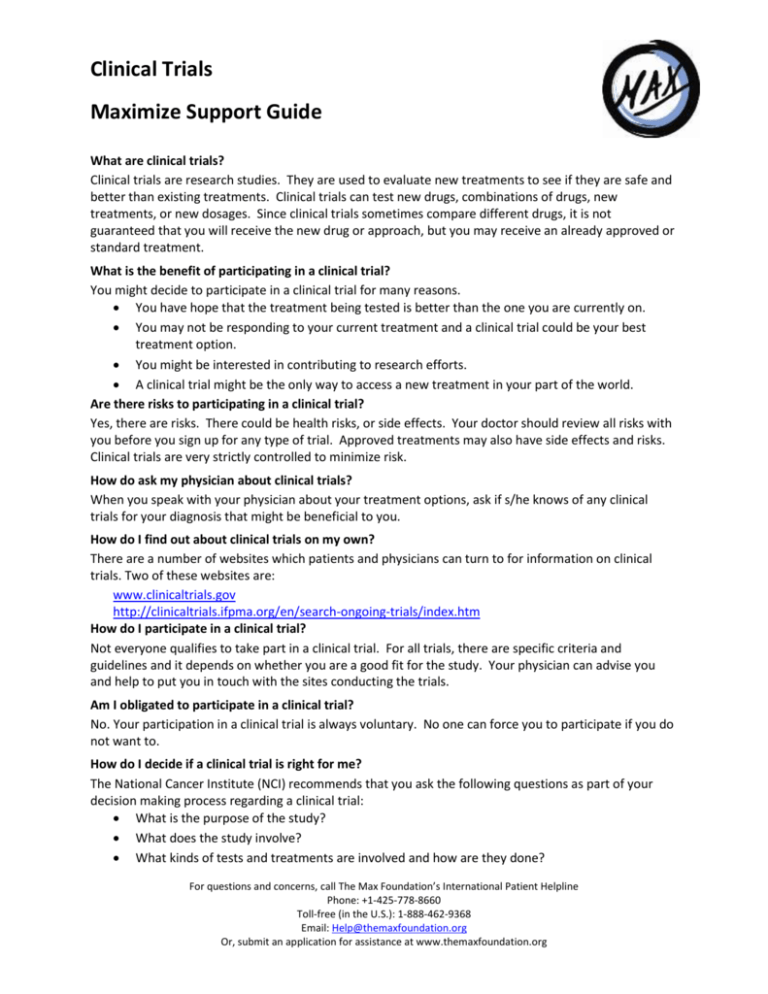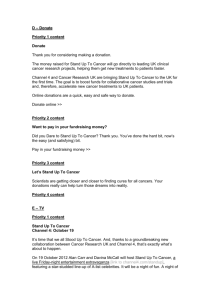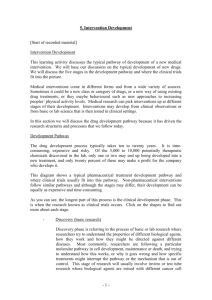Clinical Trials - The Max Foundation
advertisement

Clinical Trials Maximize Support Guide What are clinical trials? Clinical trials are research studies. They are used to evaluate new treatments to see if they are safe and better than existing treatments. Clinical trials can test new drugs, combinations of drugs, new treatments, or new dosages. Since clinical trials sometimes compare different drugs, it is not guaranteed that you will receive the new drug or approach, but you may receive an already approved or standard treatment. What is the benefit of participating in a clinical trial? You might decide to participate in a clinical trial for many reasons. You have hope that the treatment being tested is better than the one you are currently on. You may not be responding to your current treatment and a clinical trial could be your best treatment option. You might be interested in contributing to research efforts. A clinical trial might be the only way to access a new treatment in your part of the world. Are there risks to participating in a clinical trial? Yes, there are risks. There could be health risks, or side effects. Your doctor should review all risks with you before you sign up for any type of trial. Approved treatments may also have side effects and risks. Clinical trials are very strictly controlled to minimize risk. How do ask my physician about clinical trials? When you speak with your physician about your treatment options, ask if s/he knows of any clinical trials for your diagnosis that might be beneficial to you. How do I find out about clinical trials on my own? There are a number of websites which patients and physicians can turn to for information on clinical trials. Two of these websites are: www.clinicaltrials.gov http://clinicaltrials.ifpma.org/en/search-ongoing-trials/index.htm How do I participate in a clinical trial? Not everyone qualifies to take part in a clinical trial. For all trials, there are specific criteria and guidelines and it depends on whether you are a good fit for the study. Your physician can advise you and help to put you in touch with the sites conducting the trials. Am I obligated to participate in a clinical trial? No. Your participation in a clinical trial is always voluntary. No one can force you to participate if you do not want to. How do I decide if a clinical trial is right for me? The National Cancer Institute (NCI) recommends that you ask the following questions as part of your decision making process regarding a clinical trial: What is the purpose of the study? What does the study involve? What kinds of tests and treatments are involved and how are they done? For questions and concerns, call The Max Foundation’s International Patient Helpline Phone: +1-425-778-8660 Toll-free (in the U.S.): 1-888-462-9368 Email: Help@themaxfoundation.org Or, submit an application for assistance at www.themaxfoundation.org Clinical Trials Maximize Support Guide What are the other choices and their advantages and disadvantages? Are there standard treatments for my case and how does this study compare with them? Will the study affect my daily life? If so, how? What side effects and risks will I have? How long will the study last? Will I have to be hospitalized? If so, how often and for how long? Will I have any costs? Will any of my treatment be free? If I am harmed as a result of the research, what treatment would I be entitled to? What type of long-term follow-up care is part of the study? For questions and concerns, call The Max Foundation’s International Patient Helpline Phone: +1-425-778-8660 Toll-free (in the U.S.): 1-888-462-9368 Email: Help@themaxfoundation.org Or, submit an application for assistance at www.themaxfoundation.org











